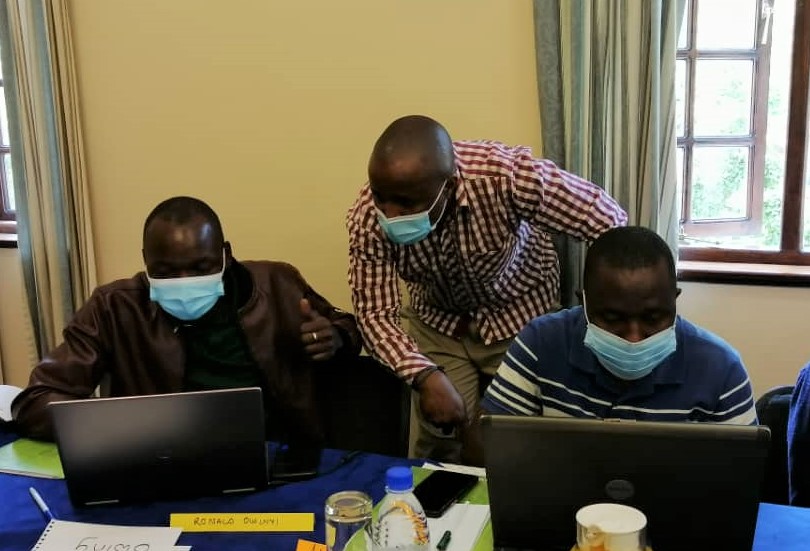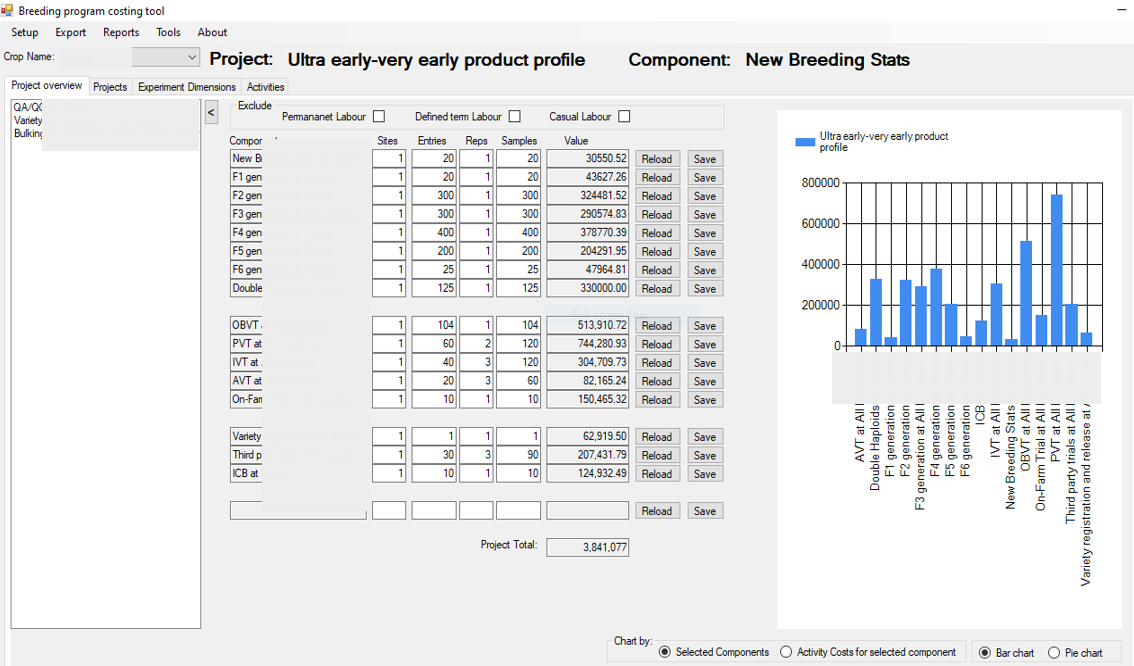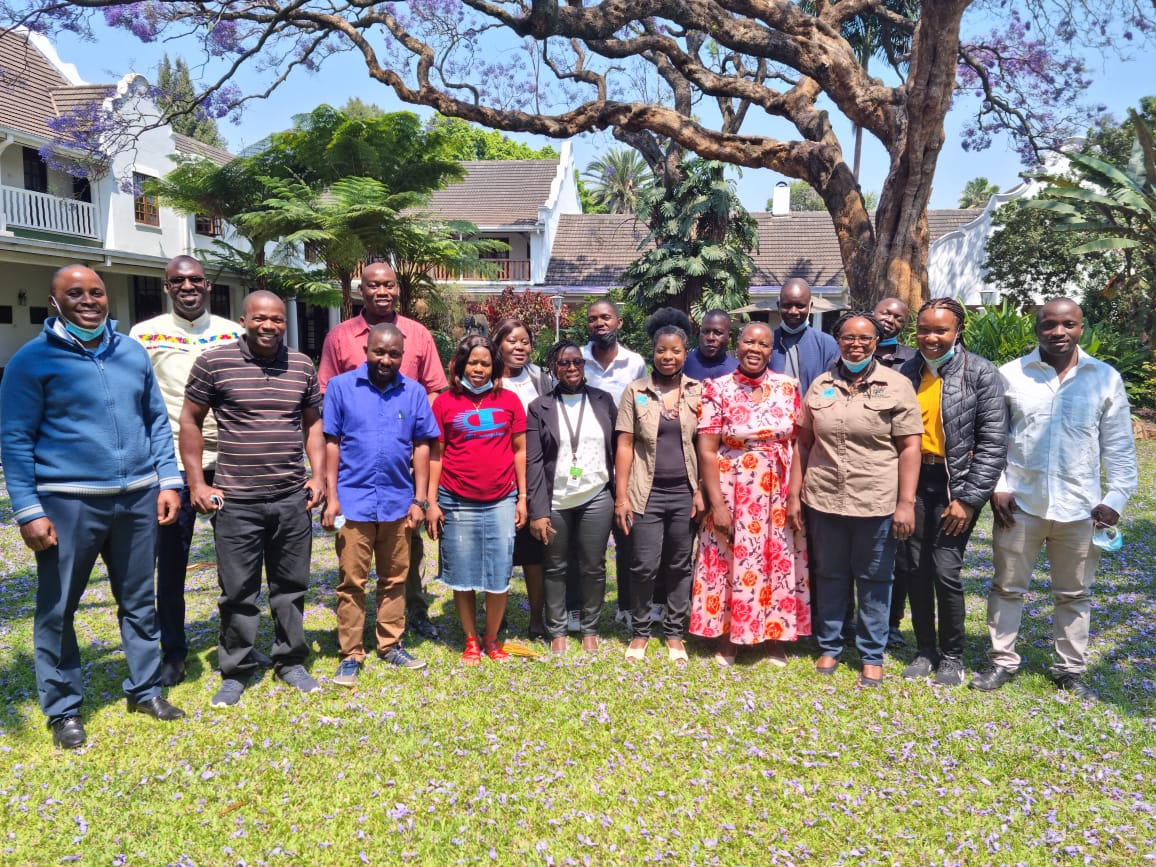
NARES course participants cost out aspects of their program using the UQ costing tool.
A new costing tool is helping national breeding programs get the financial data needed to improve their efficiency, effectiveness and transparency. And now, in its first in-person event since the beginning of the pandemic, CGIAR Excellence in Breeding (EiB) has prepped six African National Agricultural Research and Extension Systems (NARES) to fully cost their programs.
This new knowledge will enable breeders to better allocate resources and optimize their programs. For most, this is the first full program costing they have ever undertaken.
In Harare, Zimbabwe, the five-day training (Sept 27 to Oct 1, 2021) brought together 15 breeders and management staff working across at least eight crops, including maize, rice, beans, and cowpeas. To compare them across potential scenarios, participants learned the fundamentals of cost, including unit costs, product profile costing, and modelling costs.
The course culminated with participants running actual numbers, simulating the costs of their current breeding pipelines. All programs estimated their respective costs and identified high-cost activities across breeding components.

Costing tool project overview for a participant group's early product profile (identifying information redacted).
To carry out the costing, EiB trained participants to use the University of Queensland (UQ)’s “Breeding Costing Tool.” EiB and the International Maize and Wheat Improvement Center (CIMMYT) are piloting the software, collaborating with various NARES. The UQ tool is designed to be affordable and user-friendly. The resulting financial data provides programs with an accurate cost structure, potentially increasing efficiency and transparency.
“This event is a critical milestone in the improvement plans for NARES breeding programs,” said course facilitator Lennin Musundire from the EiB NARES support team. “Historically, many public national breeding programs have not been able to cost their operations fully. This will help them allocate resources among and within breeding pipelines, identify significant costs, and build their investment cases.”
Baseline assessments instigated the program costing efforts and customized improvement plans EiB supported for 11 NARES breeding programs in Africa and South Asia. Now with support from Crops to End Hunger and EiB’s technical teams, partners are implementing improvements, including improving costing, applying genotyping data, adopting data management platforms, and digitizing operations.
Once programs are fully costed, decisions can ensure higher genetic gain per dollar invested. With growing populations and environmental challenges, African NARES aims to develop new crop varieties that are climate-resilient, nutritious, and farmer-preferred. Targeting spending on the right areas of their programs will help them maximize these efforts per dollar invested.
NARES involved in the course included Uganda’s National Agricultural Research Organisation (NARO), Uganda’s National Semi-Arid Resources Research Institute (NaSARRI), Tanzania Agricultural Research Institute (TARI) – Ifakara and Ilonga, Zambia Agriculture Research Institute (ZARI) and the Crop Breeding Institute (CBI) under the Department of Research and Seed Service (DR & SS) in Zimbabwe.

Breeding Costing Training participants at the Bronte Hotel in Harare, Zimbabwe.
EiB has already worked with NARES, such as Kenya Agricultural & Livestock Research Organisation (KALRO) and Ethiopian Institute for Agricultural Research (EIAR), to help them apply the UQ tool. KALRO’s maize breeding program ran its first full costing in 2020 and discovered that guarding crops against animals, cold seed storage, and gathering flowering data were three of the highest costs. Now KALRO is applying changes to cut these costs. Several CGIAR breeding programs – including International Rice Research Institute (IRRI) and CIMMYT’s Global Maize Program – are also using the tool.
With their first-ever full program costing begun – and a return to in-person events – the near future looks hopeful for both NARES breeders and their program strategies.
-----
Story by Adam Hunt, EiB Communications lead. Contents reflect the information and views of the author/quoted individuals only. EiB and partners are supported by CGIAR Trust Fund Contributors and the Crops to End Hunger initiative, via the Bill and Melinda Gates Foundation, GIZ, BMZ, USAID, UK Aid, ACIAR and other partners.